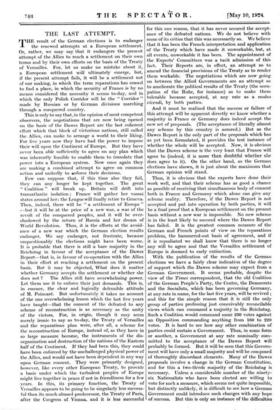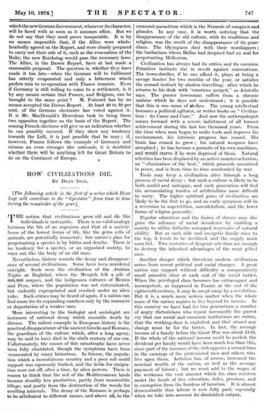THE LAST ATTEMPT.
THE result of the German elections is to endanger the renewed attempts at a European settlement. Or, rather, we may say that it endangers the present attempt of the Allies to reach a settlement on their own terms and by their own efforts on the basis of the Treaty of Versailles. For, let us make no mistake about it, a European settlement will ultimately emerge, but, if the present attempt fails, it will be a settlement not of our making, in which the term reparations has ceased to find a place, in which the security of France is by no means considered the necessity it seems to-day, and in which the only Polish Corridor will be the " Corridor " made by Russian or by German divisions marching through a conquered country.
This is only to say that, in the opinion of most competent observers, the negotiations that are now being opened on the basis of the Dawes Report are the last coherent effort which that block of victorious nations, still called the Allies, can make to arrange a world to their liking. For five years now they have had the power to impose their will upon the Continent of Europe. But they have never been able sufficiently to agree on any plan which was inherently feasible to enable them to translate that power into a European system. Now once again they are making a combined attempt to agree on common action and unitedly to enforce their decisions.
Few can suppose that, if this time also they fail, they can any longer be kept together. The great " Coalition " will break up. Britain will drift into transatlantic isolation ; France will gather her vassal states around her; the League will finally retire to Geneva. Then, indeed, there will be " a settlement of Europe " —but it will be at the price of a new war, a war of the revolt of the conquered peoples, and it will be over- shadowed by the return of Russia and her dream of World Revolution. Thus, it is the efforts at the avoid- ance of a new war which the German election results endanger. We say endanger, not frustrate, because unquestionably the elections might have been worse. It is probable that there is still a bare majority in the Reichstag in favour of the acceptance of the Dawes Report—that is, in favour of co-operation with the Allies in their effort at reaching a settlement on the present basis. But it may be objected, What does it matter whether Germany accepts the settlement or whether she does not ? The Allies still have overwhelming power. Let them use it to enforce their just demands. This is, in essence, the clear and logically defensible attitude of M. Poincare. But unfortunately it takes no account of the one overwhelming lesson which the last five years have taught—that the consent of the defeated to any scheme of reconstruction is as necessary as the unity of the victors. For, in origin, though it may seem merely ironic to say so to-day, the Treaty of Versailles and the reparations plan were, after all, a scheme for the reconstruction of Europe, instead of, as they have in so large measure become, the instruments of the dis- organization and destruction of the nations of the Eastern half of the Continent. If they had been this, they could have been enforced by the unchallenged physical power of the Allies, and would not have been dependent in any way upon German consent. They were primarily designed, however, like every other European Treaty, to provide a basis under which the turbulent peoples of Europe might live together in peace if not in friendliness for a few years. In this, its primary function, the Treaty of Versailles appears to be going to be singularly less success- ful than its much abused predecessor, the Treaty of Paris, after the Congress of Vienna. and it is less successful for this one reason, that it has never secured the accept- ance of the defeated nations. We do not believe with some of its critics that this was necessarily so. We believe that it has been the French interpretation and application of the Treaty which have made it unworkable, but, at all events, unworkable it has been. The appointment of the Experts' Committees was a tacit admission of this fact. Their Reports are, in effect, an attempt so to amend the financial provisions of the Treaty as to render them workable. The negotiations which are now going on between the Allied Governments are an attempt so to ameliorate the political results of the Treaty (the occu- pation of the Ruhr, for instance) as to make them tolerable because accepted, at any rate as a modus vivendi, by both parties.
And it must be realized that the success or failure of this attempt will be apparent directly we know whether a majority in France or Germany does indeed accept the new set of proposals. (The acceptance of literally almost any scheme by this country is assured.) But as the Dawes Report is the only part of the proposals which has as yet been formulated, it provides the test instance of whether the whole will be accepted. Now, it is obvious that the Dawes scheme is the very least that France will agree to (indeed, it is more than doubtful whether she does agree to it). On the other hand, as the German elections have shown, it is just about the maximum that German opinion will stand.
Thus, it is obvious that the experts have done their work well, and that their scheme has as good a chance as possible of receiving that simultaneous body of consent both in France and Germany which alone can give any scheme reality. Therefore, if the Dawes Report is not accepted and put into operation by both parties, it will be a final proof that a European settlement on the present basis without a new war is impossible. No new scheme is in the least likely to succeed where the Dawes Report has failed. It is the greatest common measure of the German and French points of view on the reparations problem, the hammered-out basis of agreement, and if it is repudiated we shall know that there is no longer any will to agree and that the Versailles settlement of Europe is doomed to early extinction.
With the publication of the results of the German elections we have a fairly clear indication of the degree of support which the .Dawes scheme may expect from a German Government. It seems probable, despite the view of the Times correspondent, that the old Coalition of the German People's Party, the Centre, the Democrats and the Socialists, which has been governing Germany, at any rate in name, for the last five years, will be revived ; and this for the simple reason that it is still the only group of parties professing just conceivably reconcilable views which can command a majority in the Reichstag. Such a Coalition would command some 230 votes against an Opposition commanding anything from 180 to 220 votes. It is hard to see how any other combination of parties could sustain a Government. Thus, in some form or another, a Government at any rate nominally com- mitted to the acceptance of the Dawes Report will probably be formed. But it will be seen that this Govern- ment will have only a small majority and will be composed of thoroughly discordant elements. Many of the Dawes proposals involve a change in the German Constitution, and for this a two-thirds majority of the Reichstag is necessary. Unless a considerable number of the ninety. six Nationalists who have been elected are willing to vote for such a measure, which seems not quite impossible, but distinctly unlikely, it is difficult to see how a German Government could introduce such changes with any hope of success. But this is only an instance of the difficulties which the new German Government, whatever its character, will be faced with as soon as it assumes office. But we dp not say that they need prove insuperable. It is by no means impossible that, if the Allies were whole- heartedly agreed on the Report, and were clearly prepared to carry out their side of it, such as the evacuation of the Ruhr, the new Reichstag would pass the necessary laws. The Allies, in the Dawes Report, have at last made a reasonable proposal. The question is, whether they have made it too late—when the German will to fulfilment has utterly evaporated and only a bitterness which prefers ruin to co-operation with France remains. Even if Germany is still willing to come to a settlement, is it by any means certain that France, and Belgium, can be brought to the same point ? M. Poineare has by no means accepted the Dawes Report. At least 40 to 50 per cent, of the German electorate has voted against it. It is Mr. MacDonald's Herculean task to bring these two opposites together on the basis of the Report. The coming French elections will give us an indication whether he can possibly succeed. If they show any tendency towards the Left, it is just possible that he may ; if, however, France follows the example of Germany and returns an even stronger bloc nationale, it is doubtful whether there will be anything left for Great Britain to do on the Continent of Europe. •







































 Previous page
Previous page